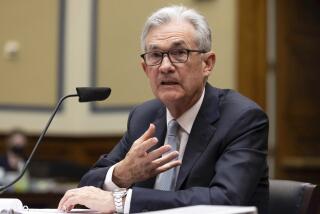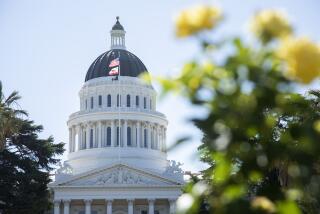Looking at a Fitful Future : Prepare for Mild Recession Starting in 1990, Geneva Cos. Chairman Advises
- Share via
The head of one of the nation’s most active merger and acquisition firms said Tuesday that he is advising clients to prepare for a yearlong recession that is likely to begin in the second quarter of 1990.
The recession should be a mild one, said Richard Rodnick, founder and chairman of the Geneva Cos. in Costa Mesa, and Orange County should escape with much less damage than will be felt in other areas of the nation.
Rodnick, who delivered his predictions to a group of area businessmen Tuesday in a speech before the Orange Coast Venture Group in Irvine, said in an interview after the meeting that the county’s diverse business base should help it weather a mild recession. “It will be less impacted than other parts of the country, but clearly will suffer somewhat in an economic turndown.”
Historical Precedent
He said that Geneva’s economists are forecasting the 1990 recession “based on historical precedent and current trends” that include the size of the federal budget deficit and the nation’s foreign trade imbalance.
In an in-house analysis of 100 years of federal financial data ending in 1986, Rodnick said, Geneva’s economists divided the century into 20 five-year periods and found that recessions occurred in all but one period, which coincided with the Korean War.
The current period of 1986-1991, he said, would be the 21st 5-year period “and while you cannot extrapolate blindly from history, there is a strong precedent, when you combine it with current trends, to suggest a recession is very likely.”
Rodnick said that in the scenario outlined by Geneva economists, “the first half of 1989 will be a mirror image of 1988, but the situation will begin deteriorating in the second half of the year, leading into a recession in 1990.” The scenario holds true regardless of which party wins the presidency in November, he said.
The economic deterioration, he said, will be marked by increases in the prime lending rate, the benchmark against which banks compute interest rates for their best and most credit-worthy borrowers.
In addition, he said, “Congress will begin addressing means of increasing federal revenue, primarily by fine-tuning the deduction of interest. By that I mean that they’ll look for ways to further decrease the amount of interest” that individuals and businesses can deduct from their federal taxes, he said.
“There will also be strong talk in Congress of a value-added tax. I don’t think there will be any action in 1989, but there is a strong possibility of legislation is 1990,” he said. “Finally, we will see Congress begin erecting barriers to offshore (foreign) buyers of U.S. businesses. . . ,” Rodnick said.
More to Read
Inside the business of entertainment
The Wide Shot brings you news, analysis and insights on everything from streaming wars to production — and what it all means for the future.
You may occasionally receive promotional content from the Los Angeles Times.










